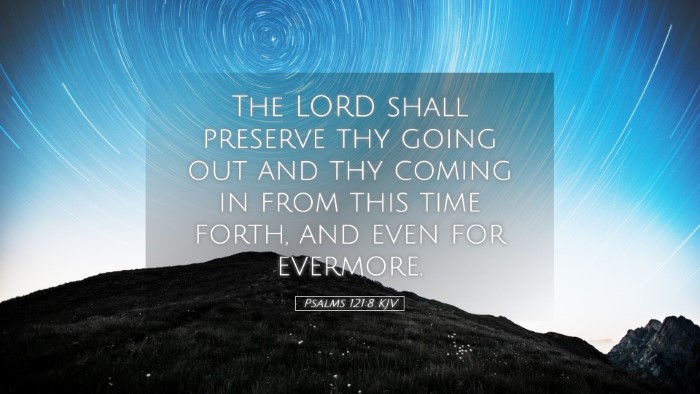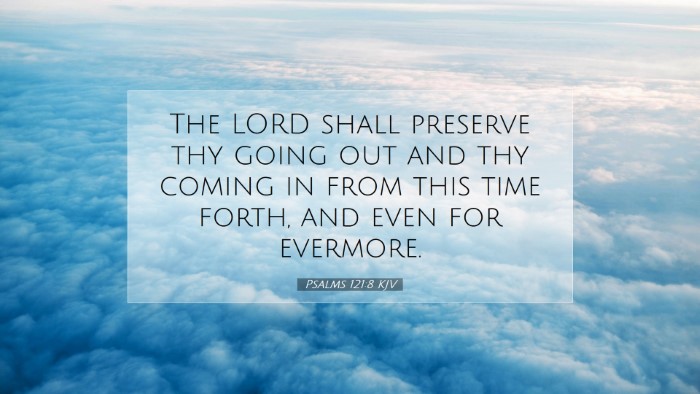Commentary on Psalms 121:8
Verse Text: "The Lord shall preserve thy going out and thy coming in from this time forth, and even for evermore."
Introduction
Psalms 121 is part of the Songs of Ascents, a collection of psalms that pilgrims sang as they journeyed to Jerusalem. This particular psalm emphasizes God's protective watch over His people. Verse 8 serves as a profound conclusion to the themes expressed throughout the psalm, assuring believers that God's preservation extends to every aspect of their lives.
Matthew Henry’s Insight
Matthew Henry elaborates on the theme of divine protection. He asserts that the Lord's protection is comprehensive: "The Lord shall preserve thy going out and thy coming in." This phrase signifies that God's safeguarding encompasses all parts of life—daily activities, transitions, and spiritual pursuits.
- Going Out: Represents the beginning of an endeavor or journey.
- Coming In: Symbolizes the completion of a journey or the return to safety.
Henry emphasizes that this protection is not limited to physical journeys but also spiritual resilience against trials and temptations.
Albert Barnes’ Perspective
Albert Barnes confirms the assurance that the Lord's preservation is constant and everlasting. He notes that the phrase "from this time forth, and even for evermore" indicates the continuity of God's watchfulness. Barnes explains this as God's eternal vigilance over His people, which assures them of His unending support.
- Timeliness of God’s Protection: It begins in the present ("from this time forth"), ensuring that believers experience stability and safety in their current situations.
- Eternal Nature of God’s Care: "Even for evermore" reveals the hope of God's protection extending into eternity, encouraging believers to look beyond earthly troubles.
Barnes highlights that understanding this divine promise fuels faith and provides a foundation for hope in difficult times.
Adam Clarke’s Exposition
Adam Clarke delves into the significance of the phrase "going out and coming in," connecting it to the day-to-day life of the believer. He posits that these activities represent the entirety of human existence, covering both the mundane and the monumental moments of life.
- This Time Forth: Clarke explains it as an immediate assurance, suggesting that believers can rely on God’s protection in the present moment.
- For Evermore: He notes that the promise is timeless, reinforcing that God’s reliability is consistent, regardless of circumstances.
Clarke stresses that this verse encourages believers to trust in God for both everyday matters and life's significant challenges.
Theological Implications
This verse underlines several important theological concepts:
- Divine Sovereignty: The Lord's active role in the lives of believers illustrates His sovereign authority over all situations.
- Constant Vigilance: God’s persistent watchfulness presents a reassuring picture of a deity who is intimately involved in the lives of His creation.
- Hope and Assurance: The unchanging nature of God's promise offers profound hope, fostering a sense of security amidst uncertainty.
Practical Applications
The rich insights from this verse can be applied in various areas of life:
- Encouragement in Trials: Remind those facing challenges that God’s protection is always present.
- Reinforcement of Faith: Encourage believers to trust in God’s comprehensive care over their daily lives.
- Community Assurance: Use this promise to bolster the faith of congregations, encouraging a collective trust in God’s guidance.
Conclusion
Psalms 121:8 serves as a powerful reminder of God’s unfailing protection over every aspect of a believer's life. By synthesizing insights from respected theologians such as Matthew Henry, Albert Barnes, and Adam Clarke, we glean a richer understanding of the profound depth encapsulated within this verse. The promise of God’s care, extending from our daily comings and goings to eternity itself, stands as a bedrock of faith and assurance for all who believe.


